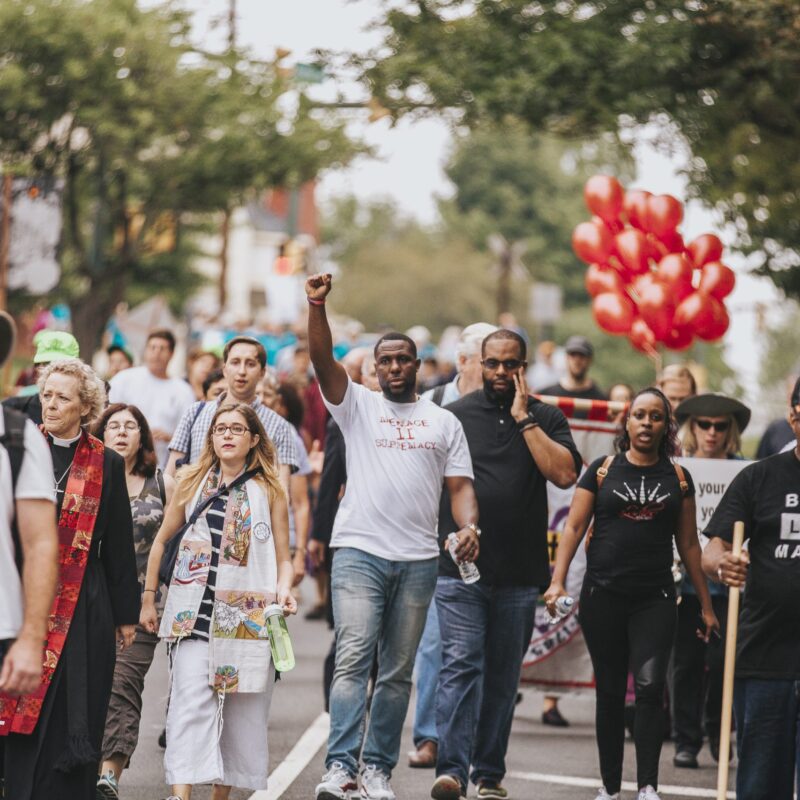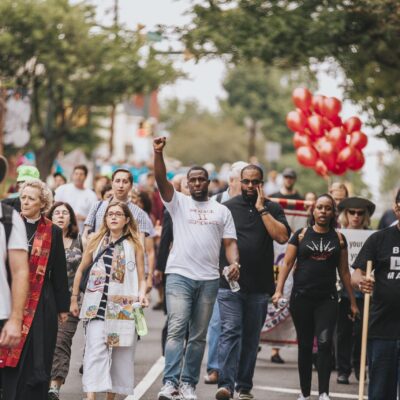After 17 years of working his way up the political ladder, Kenneth C. Boyd is arguably at the height of his influence, both as a Republican and as a local government leader. The GOP-dominated November elections exchanged two liberal-leaning Albemarle County supervisors for two Republicans who were aided in their campaigns by Boyd, and ushered him in as the new de facto majority leader.
|
The “Boyd Plan,” which the Albemarle Supervisor introduced at a recent meeting without consulting with the board chair, calls for decreased regulation, expanded land development opportunities, and curtailed government spending. |
He didn’t waste any time flexing his newfound power. In January, at the new Board’s first meeting, he pushed through a six-point action plan that represents his vision of government. This “Boyd Plan” calls for decreased regulation, expanded land development opportunities, and curtailed government spending. “Increasing economic development is now the top fiscal priority for Albemarle County,” reads the description of the first bullet point. “The best way to accomplish this is by reducing unnecessary and burdensome regulations and shortening approval times.”
His move bothered fellow supervisors Dennis Rooker and Ann Mallek, particularly as Boyd brought it up without advance public notice, during the meeting’s “Matters Not Listed on the Agenda” portion. But, as they say, elections have consequences. Boyd used his coalition—consisting of new Republicans Duane Snow and Rodney Thomas along with conservative Democrat Lindsay Dorrier—to pass the action plan 4-2.
“It’s ideas that I’ve sort of been building on during all my years on the Board of Supervisors and the school board, and a philosophy that I have that if we leave people alone to go at their own pace, they’ll do the right thing,” says Boyd. In his view, the county is bleeding sales tax revenue to places like Greene County and even Short Pump. “In Albemarle, it takes a long time to get through our process.”
Thomas calls Boyd both a spokesperson and leader. “I think we sort of give him the reigns to be the spokesperson,” he says. Thomas sought Boyd’s counsel as he prepared his campaign. “Everything in that [action plan] was my campaign. He puts it in better words than I can right now.”
So far, all the non-unanimous Board votes have fallen on the same 4-2 line, perhaps most consequentially when the supervisors opted to effectively lower property taxes, slashing the school budget by $4 million. That decision, combined with state cuts, will lead to the elimination of 45 positions, including 22 teachers, and to other tough cuts for both the county and Albemarle County Schools. But it comes as no surprise, given Boyd’s track record of pushing for smaller government.
At last week’s Board meeting, tensions flared over Boyd’s agenda—and his methods. Without the knowledge of Rooker and Mallek, Boyd had met with local business leaders and staff had drawn up a new economic development plan. Mallek had no idea it would be on the agenda—even though she is Board chair. Rooker reprimanded Boyd for his lack of consultation, Boyd offered a partial apology, and the plan was punted to a work session. What was revealed, though, was the degree to which Boyd is running the show.
Despite his already lofty perch, however, Boyd is aiming for a higher rung: Congress. He is one of seven candidates vying for the GOP nomination. The winner will be crowned in a June 8 primary. Can Boyd’s businessman image translate to the Fifth District’s conservative faithful and Tea Party enthusiasts, or has the ascension of Ken Boyd reached its natural limit?
"I believed in individualism"
“I’ve not grown up with the idea that I wanted to be a politician,” says Boyd. “But I have learned that politics is a lot about opportunity and circumstance.”
Boyd saw that opportunity when Virgil Goode decided not seek a rematch with the young Democrat, Tom Perriello, who had narrowly bested the six-term congressman in 2008. Boyd announced his intention in September, and for a little while, the nomination seemed within his reach.
Instead, Boyd has found himself trying to stand out in a crowded pack. After Boyd announced, State Senator Robert Hurt from Chatham entered the race and became the immediate frontrunner. Boyd’s odds grew longer as four politically inexperienced—but largely self-funded—party outsiders joined the fray, including two Albemarle County men, Laurence Verga and Michael McPadden. To top it off, Boyd also has to fend off a Fluvanna County challenger, Feda Kidd Morton, who has long paid her dues as an activist in the local and statewide GOP organizations.
In campaigning for Congress, Boyd is asking Fifth District voters to send him back to his hometown. Boyd, 62, grew up in a Catholic family in Washington, D.C. He attended the District’s Woodrow Wilson High and remembers paying respects at the casket of John F. Kennedy.
Still, Boyd says, growing up neither he nor his parents were particularly political. “I believed in individualism. My father brought me up, when you’ve got a problem, you deal with it yourself. I started working at 10, delivering papers, and had this ethic that you had to work and provide for yourself. I don’t know that it was Republican per se.”
Just before Boyd finished high school, his father left the capital for Burlington, North Carolina, where he sold insurance. Boyd and the rest of the family followed after he graduated. Boyd didn’t go to Vietnam—a bad back from a car wreck kept him from passing the physical, he says.
Boyd got an early dose of the campaign trail in 1968 by working for a North Carolina gubernatorial candidate, Bob Scott, a moderate Democrat. “I enjoyed it. But back then, it was a big party. We’d knock on doors, go to rallies. It was not about ideology as much as fun.”
|
“Ken’s a conservative Republican, but he’s not a fire breather,” says Charlottesville Mayor Dave Norris, commenting on the seven-way race for the GOP Congressional nomination that includes Boyd. “I’ve watched a couple of the debates, and it’s interesting watching him try to position himself as somebody who can capture that passion that you’re seeing now among the conservative base.” |
For the next 25 years, Boyd largely ignored politics for career and family. He went to college at the University of Dayton, but dropped out, and instead trained to install a bank’s first computer system. He stuck with the evolving field of banking technology, and mergers and promotions kept him on the move. He spent five years working in Martinsville—at the southwestern edge of the Fifth Congressional District—where he met his wife, Brenda. They moved to Richmond and then, in 1982, to the Charlottesville area, where he eventually managed the technology side of Jefferson National Bank. He left in 1991 to start his own business as a financial planner. Not until all but one of his four children had gone to college did Boyd himself finish his undergraduate degree (at the local satellite campus for Averett University). He tacked on an MBA.
As his children left the nest, Boyd returned to politics, volunteering on Republican George Allen’s gubernatorial campaign in 1993. After Allen’s victory, Boyd stayed involved with the party, and when the county changed to an elected school board from an appointed one in 1995, he considered running.
“When my youngest son started getting up there in years, I was a little dismayed at what was going on in the school system,” says Boyd. He wanted more accountability for teachers. His son “came home with A’s on papers I would have given an F to.” Boyd was impressed with George Allen’s Standards of Learning platform.
But another Republican, Dr. William Orr, wanted to run, and the local party put them in a room and told them not to leave until they figured it out. Boyd gave in. Orr lost, however, and in 1999, Boyd ran unopposed for the seat.
On the school board, Boyd played substantially the same role he has played on the Board of Supervisors, says Diantha McKeel, a school board member since 1997. “I see Ken discussing a lot of the same things at the Board of Supervisors level that we discussed at the school board level,” says McKeel, with Boyd ever on the lookout for cost savings—to the point where she found many of his positions penny wise and pound foolish, potentially jeopardizing the schools’ quality and hence one of the area’s key attractions for businesses.
In 2003, Boyd traded up for a seat on the Albemarle Board of Supervisors. “My youngest son had graduated,” says Boyd, “and I was approached by some business leaders and people in the community who said, ‘We really like the way that you handled yourself and the principles and values you showed on the school board.’”
Boyd lives in the county’s northeastern district, Rivanna, which comprises populous areas like Hollymead and Pantops as well as the country corridors along Routes 20 and 22, with their mix of horse farms and modest cottages. Each of his Board of Supervisors campaigns has required a tough fight. In 2003, he faced Peter Hallock, a Democrat who ran on an anti-sprawl platform, and Boyd won by a 5 percent margin. In 2007, an especially tough year overall for county Republicans, Boyd won an election fought over similar issues against Marcia Joseph, but by only 3 percent.
As a supervisor, Boyd has been consistent. Each year, when it’s come time to set a tax rate, he’s sought to effectively lower property taxes, or at least keep them from rising. Additionally, he tends to view extra regulation as an impediment to property rights and economic growth rather than a useful tool to protect the environment.
Charlottesville Mayor Dave Norris, a Democrat, says that Boyd has always been personally pleasant even when the city and county were having trouble seeing eye to eye, as in a recent dispute over school funding formulas that involved $2.6 million in revenue sharing funds that the county tried to keep from the city. “We don’t always agree, but I have a lot of respect for him,” says Norris. They recently collaborated to expand the local water and solid waste authorities to include elected officials.
Rob Bell, the Republican state delegate who represents about half of Albemarle, has worked with Boyd since both were GOP volunteers and considers him a friend (though he’s not endorsing him, or anyone else—he has other friends in the race). “He is very diligent about his meetings, I’m not aware of him saying things that embarrass people, he works real hard. In terms of local public service, that’s what you’re looking for, and he certainly delivered.”
Vying for "Most Conservative"
To date, Boyd’s victories have come through hard work. “Ken just worked to death,” says Bell. “The districts are small compared to what I’m used to, but it does mean that you really can knock on every single door if you chose. And he did.”
That kind of strategy can work when only 3,500 and 4,700 come out to vote, as in Boyd’s respective supervisor elections. But the Fifth Congressional District is the size of New Jersey, and 158,000 voters cast ballots for Virgil Goode in 2008. The race demands a different strategy, with selected targeting of conservative voters across the 22 localities.
Naturally, Tea Party rallies have become fertile recruiting grounds. At the April 15 Tax Day Rally on the grassy bank between Route 29 North and the U.S. Post Office, those assembled certainly had little love for incumbent Congressman Perriello. One of the most prominent displays was a photo of a bearded Perriello (the same one used in some of Goode’s attack ads during the ’08 race) crossed out with the words “Thief, Tyrant, Traitor.”
“I am really, really excited about the Tea Party movement,” Boyd says. Unfortunately for him, it has so far failed to return the favor. The “Tea” in Tea Party is supposed to be an acronym—“Taxed Enough Already”—and if the movement were solely focused on taxes, Boyd would have a strong claim on its support. But those I met at the April 15 rally espoused a wide gamut of beliefs. One old man who refused to give his name for fear his car would get egged, questioned Barack Obama’s birthplace, and claimed that the president is trying to intentionally overwhelm the welfare system in order to create a completely dependent state. I also talked to a developer and musician, Peter Nardone, who hasn’t been politically active since he protested the Vietnam War. He seemed particularly frustrated by lawyers—and Barack Obama’s tendency to pop up everywhere.
|
Boyd’s political career began with his 1999 election to the Albemarle County School Board, where, says Diantha McKeel, he played a role similar to his position on the Board of Supervisors. Always scanning for cost savings, he is sometimes, she says, penny wise and pound foolish. |
“I go all the way to freaking Miami to watch a football game,” says Nardone, “and before the game, I’ve got to watch him make a speech. Serve the führer? Serve the government? I’m like, holy shit, I can’t turn off the TV and get away from the guy. Everyday, he’s intruding on my life.”
Boyd and Verga prowled around the edges, as did Hurt staffers, but the candidates themselves never took center stage. Some of the loudest applause came when a scruffy young man in t-shirt, soccer shorts and flip-flops galvanized the crowd. “Once the tyrannical state takes power, no amount of complaining will ever take that power back to the people,” shouted the man, John Slovensky. “Today we are reasserting our property rights, which this system of taxation fundamentally treads on.” He’s supporting Mike McPadden, who has also picked up the endorsement of the GOP’s libertarian caucus.
Recent history suggests that the candidate who wins Most Conservative wins the Republican primary. Across the nation, moderate Republicans have been hunted out—from Arlen Specter to Charlie Crist—and are an increasingly endangered species. In immigration-embroiled Arizona, Senator John McCain has even jettisoned his “maverick” label as he fends off a right-winger in the primary.
But with so many candidates vying for that Most Conservative label, the Fifth District primary could buck the trend. Hurt has been castigated for voting with the majority for then-Governor Mark Warner’s 2004 state tax increase, but despite other candidates’ attempts to tar him as a RINO—Republican In Name Only—Hurt led in the only publicly released poll by an independent firm. Conducted in February by Public Polling Policy, the poll put Hurt neck and neck with Tom Perriello, each with 44 percent. The wide field has also led to a donor split that has helped Hurt—he’s the only primary candidate who hasn’t given his campaign a personal loan.
Boyd came in second in that February poll, garnering 42 percent in a head to head with Perriello, who polled at 46 percent. But unlike Hurt, Boyd has struggled to raise the money necessary to buy the TV and radio time he will need. He brought in only $19,000 in the first quarter, and loaned his campaign $11,000 to stay competitive. Federal Election Commission filings show that McPadden and Verga have made inroads into Albemarle County fundraising, likely siphoning off some of Boyd’s potential support. Boyd has gotten money from his usual allies in the business and development world like ACAC’s Phil Wendel, landowner Fred Scott, developer Richard Hewitt, and onetime Biscuit Run developer Hunter Craig, but many donors seem to be holding out until after the primary. Others are spreading the love—Doug Caton, CEO of Management Services Corporation, has donated $1,000 to both Boyd and Hurt.
This is the first time Boyd has had to publicly fight for the Most Conservative mantle. In his supervisor races, he’s had little incentive to harp on social issues, a strategy more likely to turn off potential supporters than attract new ones in a moderate district like Rivanna. He gravitated toward Mitt Romney in the 2008 GOP primary because of his business bona fides. But for this primary, Boyd has hewed close to the traditional Republican line. The issues section of his website include all the usual stances—pro-life, pro-gun rights, anti-gay marriage.
Still, Boyd spends much more time talking about business issues and smaller government than about social issues like abortion or gay marriage.
“The Tea Party is definitely pulling that contest to the right,” says Norris. “Ken’s a conservative Republican, but he’s not a fire breather. He’s never been a fire breather. I’ve watched a couple of the debates, and it’s interesting watching him try to position himself as somebody who can capture that passion that you’re seeing now among the conservative base.”
“I think I’m as conservative as anybody else in this race, probably more conservative than some,” Boyd says. “But I’ve also got a little bit of experience and background, in life situations and business situations and government situations, and I think that’s the kind of common sense attitude we need to take to Washington.”
He illuminates his governing philosophy by talking about an item that came before the Board last year, prior to the conservative shift. Boyd was the only Board member to oppose Albemarle County’s involvement in establishing a Local Energy Alliance Program, which was awarded a $500,000 grant to perform energy audits on area homes so that homeowners can make them more energy efficient. The county was partnering with the city and private groups, and public funds were only marginally involved, but Boyd was afraid government would end up administering the program.
“That’s a difficult thing for a politician—I don’t call myself a politician, a legislator, somebody at a local level—to draw a line at,” Boyd says. “My line was the fact that, even though this was such a great thing, a terrific thing, I didn’t think it was something that government should be involved with, with taxpayer dollars.
“That’s taken as, you’re against allowing people who can’t afford it to modernize their homes. No, I’m not opposed to that. We should have some sort of private sector program to do that. But that’s the place to do it—not in government —because that’s the way the incrementalism works in government, how we gradually grow bigger and bigger and bigger. Then we’ve got all these things we’re doing for everybody, and there’s no way to stop them.”
Straw polls and fishing lines
The Fifth District Convention on May 1 offered one last mass meeting for Boyd to woo the party faithful. Though the official business was limited to selecting a district chairman —Albemarle resident Christian Schoenewald lost to Franklin County’s Bill Stanley—more than 300 delegates packed into a Hampden-Sydney auditorium and listened to five-minute speeches from each of the primary candidates.
But Boyd and the others were upstaged by Feda Kidd Morton, a “fire breather,” to borrow Norris’ term, who wore a bright red jacket and clearly was in her element. Her rousing speech was worthy of a Pentecostal preacher (“Good people have been politically corrected out of the process so that the evil empire we thought was dead has moved into Washington”) and she feels good about her chances.
“Seventy-two percent undecided and low turnout—it’s my ballgame!” she told me. Morton won the straw poll conducted during the convention, which asked delegates to rank each candidate in order. Morton got 30 percent of the first place votes, followed by Hurt with 25 percent. Boyd, meanwhile, placed fourth, with only 8 percent of the first place votes. Not terrible, but not particularly encouraging either.
If the nomination doesn’t work out, Boyd has the Board of Supervisors to fall back on. No doubt he will continue to be a favorite of local developers and business leaders who rightly see him in position to streamline the sometimes-arduous approval process. His opinion will go a long way in determining what happens as the city and county work through conflicts about the revenue sharing agreement, school funding, and the long-term water supply plan.
As of now, however, he’s not anticipating a third run. “I’ve all but come to the conclusion that this is going to be my last term on the Board of Supervisors.”
That would mean only one more budget cycle with Ken Boyd. But while that may dismay his constituents who want lower taxes and less regulation, it will give Boyd a chance to get back to the hobbies that he has neglected since joining the Board—hunting, golfing, fishing. Boyd’s preferred retreat is the Rappahannock River, where he keeps a boat. Next fall, as he finishes his 12th season on local boards, perhaps he can return to casting his line for rockfish, instead of votes.








